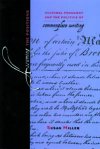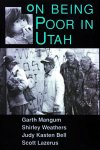Bookshelf
Out in the Field and Lost in the Faculty Library: Research Hits
the Presses
 Focusing
on ordinary acts of writing and what they reveal about culture and identity,
Susan Miller's Assuming the Positions: Cultural Pedagogy and
the Politics of Commonplace Writing includes transcriptions and analyses
of the commonplace book collection of the Virginia Historical Society.
Miller, a professor in the U's writing program, says that she wanted to
"question the assumption that all writing is either 'good' or 'bad,' in
favor of turning attention to the purposes and results of the act of writing
in specific cultural settings." One such setting is Utah, a place that
piqued Miller's interest in writing done outside of schooling and professions.
Discovering "an entire population of people who regularly keep journals
and careful records of their lives and relationships" in Utah, Miller
says she is "fascinated by the popularity of Day timers, because they
are both records of what we have done and directions for what we will
do." Her research into eighteenth-and nineteenth-century writings revealed
many surprises. "it was like finding the solutions to mysteries I didn't
know existed until I solved them." (1998, University of Pittsburgh Press,
Pittsburgh, PA, 15260; paper) Focusing
on ordinary acts of writing and what they reveal about culture and identity,
Susan Miller's Assuming the Positions: Cultural Pedagogy and
the Politics of Commonplace Writing includes transcriptions and analyses
of the commonplace book collection of the Virginia Historical Society.
Miller, a professor in the U's writing program, says that she wanted to
"question the assumption that all writing is either 'good' or 'bad,' in
favor of turning attention to the purposes and results of the act of writing
in specific cultural settings." One such setting is Utah, a place that
piqued Miller's interest in writing done outside of schooling and professions.
Discovering "an entire population of people who regularly keep journals
and careful records of their lives and relationships" in Utah, Miller
says she is "fascinated by the popularity of Day timers, because they
are both records of what we have done and directions for what we will
do." Her research into eighteenth-and nineteenth-century writings revealed
many surprises. "it was like finding the solutions to mysteries I didn't
know existed until I solved them." (1998, University of Pittsburgh Press,
Pittsburgh, PA, 15260; paper)
 A
cross-disciplinary collection of essays from philosophers, physicians,
theologians, social scientists, lawyers, and economists, Physician
Assisted Suicide: Expanding the Debate addresses what editor Margaret
P. Battin calls "an increasingly contentious social issue." Battin,
a professor of philosophy and an adjunct professor of internal medicine
in the Division of Medical Ethics at the U, and her co-editors, Rosamond
Rhodes and Anita Silvers, assembled a range of opinions about physician-assisted
suicide, including the religious, clinical, economic, and philosophical
aspects of it. "I have been working on this topic for a very long time,"
Battin says. "It's important to look at both sides of it. The book maintains
a balance of views on each aspect, with particular attention to those
issues affecting the most vulnerable groups in our society." One of those
groups, the elderly, is the subject of an essay by Leslie Pickering Francis,
a professor of law, professor of philosophy, and a member of the Division
of Medical Ethics at the U. (1998, Routledge, 29 W. 35th St., New York,
NY, 10001; paper; $21.99) A
cross-disciplinary collection of essays from philosophers, physicians,
theologians, social scientists, lawyers, and economists, Physician
Assisted Suicide: Expanding the Debate addresses what editor Margaret
P. Battin calls "an increasingly contentious social issue." Battin,
a professor of philosophy and an adjunct professor of internal medicine
in the Division of Medical Ethics at the U, and her co-editors, Rosamond
Rhodes and Anita Silvers, assembled a range of opinions about physician-assisted
suicide, including the religious, clinical, economic, and philosophical
aspects of it. "I have been working on this topic for a very long time,"
Battin says. "It's important to look at both sides of it. The book maintains
a balance of views on each aspect, with particular attention to those
issues affecting the most vulnerable groups in our society." One of those
groups, the elderly, is the subject of an essay by Leslie Pickering Francis,
a professor of law, professor of philosophy, and a member of the Division
of Medical Ethics at the U. (1998, Routledge, 29 W. 35th St., New York,
NY, 10001; paper; $21.99)
 On Being Poor in Utah by Garth Mangum JD'89, Shirley
Weathers BA'72 MA'75 PhD'83, Judy Kasten Bell, and Scott
Lazerus BA'86, which examines in detail the conditions facing Utah's
poor, grew out of the longtime anti-poverty interests and activities of
all the authors, especially Mangum. "Childhood on a series of sharecrop
farms and growing up in a family who, among them, including myself, were
enrolled in every New Deal work-relief program of the 1930s may have given
me a predisposition for the study of poverty," the emeritus professor
of economics says. While serving on the State Homeless Coordinating Committee,
the State Job Training Coordinating Committee, and the State Child Support
Guidelines Committee, he approached two colleagues, Weathers and Bell,
to write a book, along with then-doctoral candidate Scott Lazerus. Mangum
says the book, filled with revealing statistics about who is poor in Utah
and why, and poignant individual anecdotes, is meant "to enlighten opinion-influencers
and policymakers that, though poverty is relatively low in Utah, it doesn't
hurt any less for those experiencing it." (1998, University of Utah Press,
Salt Lake City, UT, 84112; paper; $24.95) On Being Poor in Utah by Garth Mangum JD'89, Shirley
Weathers BA'72 MA'75 PhD'83, Judy Kasten Bell, and Scott
Lazerus BA'86, which examines in detail the conditions facing Utah's
poor, grew out of the longtime anti-poverty interests and activities of
all the authors, especially Mangum. "Childhood on a series of sharecrop
farms and growing up in a family who, among them, including myself, were
enrolled in every New Deal work-relief program of the 1930s may have given
me a predisposition for the study of poverty," the emeritus professor
of economics says. While serving on the State Homeless Coordinating Committee,
the State Job Training Coordinating Committee, and the State Child Support
Guidelines Committee, he approached two colleagues, Weathers and Bell,
to write a book, along with then-doctoral candidate Scott Lazerus. Mangum
says the book, filled with revealing statistics about who is poor in Utah
and why, and poignant individual anecdotes, is meant "to enlighten opinion-influencers
and policymakers that, though poverty is relatively low in Utah, it doesn't
hurt any less for those experiencing it." (1998, University of Utah Press,
Salt Lake City, UT, 84112; paper; $24.95)
 Twelve
years of research by the U's first full professor of Hebrew and Jewish
studies, Harris Lenowitz, has produced The Jewish Messiahs:
From the Galilee to Crown Heights. In the Hebrew bible, "messiah"
referred to holy prophets and priests, as well as kings; in later Judaism,
it has been associated with a semidivine figure whose future reign will
bring everlasting justice, peace, and security. Lenowitz tells the stories
of messiahs who have appeared over the last two millennia, ranging from
the tragic to the comic and bizarre, but always occurring at times of
desperation. "I came to see messianic movements as a variety of drama,
a constantly repeated ritual, a tragedy – as I guess Jewish political
life was," he says. Many of the messiahs' stories in the book are first-time
translations. Though Lenowitz is interested in why the messianic ritual
keeps recurring, he says there is not likely to be another messiah in
the near future. "Maybe in another thousand years, if the comet doesn't
get us first, the situation for the re-enactment of this drama will occur."
(1998, Oxford University Press, 198 Madison Ave., New York, NY, 10016;
hardcover) Twelve
years of research by the U's first full professor of Hebrew and Jewish
studies, Harris Lenowitz, has produced The Jewish Messiahs:
From the Galilee to Crown Heights. In the Hebrew bible, "messiah"
referred to holy prophets and priests, as well as kings; in later Judaism,
it has been associated with a semidivine figure whose future reign will
bring everlasting justice, peace, and security. Lenowitz tells the stories
of messiahs who have appeared over the last two millennia, ranging from
the tragic to the comic and bizarre, but always occurring at times of
desperation. "I came to see messianic movements as a variety of drama,
a constantly repeated ritual, a tragedy – as I guess Jewish political
life was," he says. Many of the messiahs' stories in the book are first-time
translations. Though Lenowitz is interested in why the messianic ritual
keeps recurring, he says there is not likely to be another messiah in
the near future. "Maybe in another thousand years, if the comet doesn't
get us first, the situation for the re-enactment of this drama will occur."
(1998, Oxford University Press, 198 Madison Ave., New York, NY, 10016;
hardcover)
 Fun
fact: Because of its high birth rate, Utah has a legitimate reputation
for youthfulness. Yet it is actually the fifth fastest aging state in
the nation. Much of the responsibility to record, analyze, and provide
such demographic data has fallen on the Gerontology Center at the University
of Utah College of Nursing. The center's expertise gave rise to publication
of the Utah Sourcebook on Aging, which gives an up-to-the-minute
overview of the demographic, educational, advocacy, and policy issues
of aging in Utah and the Intermountain West. Edited by Scott D. Wright,
associate professor and coordinator of graduate studies in the Gerontology
Center, the 417-page book is a comprehensive resource guide that includes
more than 60 tables, 40 figures, 250 supplementary notes, and more than
100 Internet sites related to the field of aging. "People are always asking
us for more information about demographics, services, education, and advocacy
issues for all of Utah," the editor explains. (1998, Empire Publisher,
P.O. Box 521523, Salt Lake City, UT, 84152; paper; $26) Fun
fact: Because of its high birth rate, Utah has a legitimate reputation
for youthfulness. Yet it is actually the fifth fastest aging state in
the nation. Much of the responsibility to record, analyze, and provide
such demographic data has fallen on the Gerontology Center at the University
of Utah College of Nursing. The center's expertise gave rise to publication
of the Utah Sourcebook on Aging, which gives an up-to-the-minute
overview of the demographic, educational, advocacy, and policy issues
of aging in Utah and the Intermountain West. Edited by Scott D. Wright,
associate professor and coordinator of graduate studies in the Gerontology
Center, the 417-page book is a comprehensive resource guide that includes
more than 60 tables, 40 figures, 250 supplementary notes, and more than
100 Internet sites related to the field of aging. "People are always asking
us for more information about demographics, services, education, and advocacy
issues for all of Utah," the editor explains. (1998, Empire Publisher,
P.O. Box 521523, Salt Lake City, UT, 84152; paper; $26) |


![]()